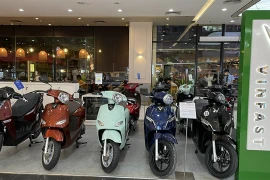 Mr. Cua's rice on sale in a supermarket in Hanoi. The trademark has been registered in the UK. (Photo: VNA)
Mr. Cua's rice on sale in a supermarket in Hanoi. The trademark has been registered in the UK. (Photo: VNA)After Brexit, Britain is reaching new partners as an independentactor and Vietnam, together with Singapore, are the two ASEAN countries that havesigned a free trade deal with the UK, showing their important position in theUK’s trade policy.
The UKVFTA, which officially came into force on May 1, 2021, hasbeen a key driver for rapid trade growth between the two markets.
Total trade in goods and services (exports plus imports) betweenthe UK and Vietnam reached 5.7 billion GBP (6.6 billion USD) in the fourquarters to the end of Q1 2022, up 15% from the four quarters to the end of Q12021, the latest data from the UK’s Department for International Trade showed.
Of this, Vietnam’s exports to the UK increased 18.3% to 4.8billion GBP, while total UK exports to Vietnam amounted to 905 million GBP, up0.2%.
Despite the growth, ample room is unexploited when Vietnam is theUK’s 36th largest trading partner, accounting for just 0.4% of total UK trade.
Opportunitiesfrom trademark registration
Tran Quang Vu, head of the Strategy Development and Export of Mr.Cua's Rice, shared the company’s trademark registration story in the UK and othermarkets with Vietnam News.
Soc Trang-based ST25 fragrant rice, developed over 25 years by HoQuang Cua and his colleagues, won the World’s Best Rice title in 2019, markingthe first time a Vietnamese variety had claimed the top spot in the contest’s11-year history.
Vu said after being awarded, many businesses overseas registered atrademark for ST25 rice in the US, Australia and some European countries,causing difficulties for Vietnamese exporters who want to export this rice tothese markets.
Therefore, Ho Quang Tri Enterprise, the owner of Mr. Cua’s Ricebrand, hired international law firm Baker & McKenzie to assist inregistering the trademark in overseas markets. To date, the trademark of Mr.Cua's Rice had been approved in the EU, UK, mainland China and Hong Kong. Theapplication was being processed in Australia, the US and Vietnam.
“Since having the certification, many businesses overseas haveactively contacted our company, wanting to be an exclusive distributor,” Vũsaid, adding the reputation has given the rice good marketing conditions buthaving a protected trademark makes both the company and foreign partners moreconfident when reaching out to the world.
Sharing about the difficulties during the trademark applicationprocess, Vu said Vietnamese companies should hire a professional law firm to dothe work as each country has different legal requirements.
“It saves time and even costs,” Vu said.
In June, more than 23 tonnes of Mr. Cua's rice was exported to theUK under trademark protection.
Vu said the ST25 and ST24 rice varieties were being processed toadd to the list of rice that enjoy preferential tariffs under the UKVFTA.
Denzel Eades, vice president of Britcham Vietnam, said:“Vietnamese brands have a fantastic opportunity to expand market share througha combination of the advantages conferred by the UKVFTA and their ability todistinguish themselves from established brands.”
He said Vietnamese brands and products were becoming increasinglypopular in the UK and recommended Vietnamese businesses engage as much aspossible with consumers in the UK to understand the market and to assist inbuilding a brand.
“New brands seeking to enter the UK can gain competitive advantagethrough increasing awareness of UK customer demand and preferences whilstcapitalising on the benefits of having been produced in Vietnam,” Eades said,suggesting Vietnamese enterprises reach out to organisations such as Britchamto understand and access the market.
Currently, to facilitate the importers, Vietnamese enterprises areoften willing to allow distributors to use their own brands. For example,Vietnamese rice is sold under UK brands such as Longdan, Golden Lotus, Buffalo,Green Dragon and Red Ant.
The reason is that the exporter has not built their own brandnames, so they are not known to local consumers. In addition, localdistributors consider their own brands to be more effective in marketing thanexporters' brands.
However, the UK is negotiating to join the Comprehensive andProgressive Agreement for Trans-Pacific Partnership and after the deal issigned, the advantages of preferential tariffs that Vietnamese products areenjoying under the UKVFTA will diminish, that’s why Vietnamese enterprises needto soon assert their positions in the UK. Trademark registration can beconsidered the first and most important step in this strategy.
According to Vo Tri Thanh, Director of the Institute of Brandingand Competition Strategy, the businesses themselves should be active inbuilding their brands, contributing to the growth of the national brand. To dothat, it is necessary to invest in market research, thereby creating productsthat are suitable for local consumers' preferences, especially developingproduct standards to ensure the transparency of the production process,catching up with the green lifestyle trend./.





























